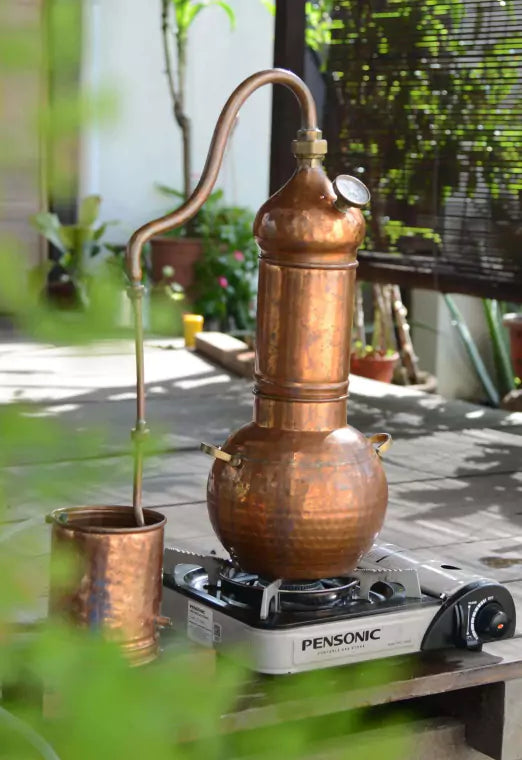About Us
What is an Essential Oil?
An essential oil is a concentrated and aromatic liquid that is extracted from various parts of plants, such as leaves, stems, flowers, or roots. They're like the life force of the plant itself, captured in a tiny, potent bottle. Typically, techniques like solvent extraction, cold pressing, or steam distillation are used to produce essential oils.They are the gifts from nature that have numerous advantages for the mind, body, and spirit. You can benefit from their therapeutic qualities, improve your well-being, and move closer to a more organic and holistic lifestyle by adopting them into your daily routine.
Extraction Process
How Are They Extracted?
-
Plant Selection
The selection of the plant material is the first step in the procedure. Essential oils can be found in a variety of plant parts, including leaves, flowers, stems, bark, and roots
-
Harvesting
After selection, the best time to harvest them is chosen to guarantee the highest oil content. Depending on the plant, different harvesting techniques are used, but it's important to handle the plant material delicately to maintain the oil's purity.
-
Extraction
There are several methods for extracting essential oils, with the most common being steam distillation. Other extraction methods include cold-press extraction for citrus oils, solvent extraction and CO2 extraction.
-
Seperation
After extraction, the oil is separated from any remaining water or plant matter.As the essential oil floats on top of the condensed water during steam distillation, this separation might happen spontaneously.
-
Bottling & Testing
Once separated, the essential oil is carefully bottled. Testing and quality control procedures are often conducted to ensure the oil meets specific standards for purity, aroma, and chemical composition.

Our Benefits
Benefits Of Essential Oils
In a world of synthetic fragrances and chemicals, essential oils are like a breath of fresh air, offering holistic wellness in a bottle. So why not dive into this world of natural wonders and let essential oils transform your life, one drop at a time?
Therapeutic Properties
Many essential oils have medicinal effects that can help with a variety of mental and physical issues, including lowering stress, reducing pain, and boosting the immune system.
Stress Reduction
Inhaling the soothing aromas of essential oils or incorporating them into massages can help lower stress levels and promote relaxation
Natural Cleaning
Essential oils with natural antibacterial characteristics, such as tea tree, lemon, and eucalyptus, are great additions to DIY cleaning solutions. They can leave behind a pleasant aroma and aid in surface disinfection.
Mood Enhancement
Essential oils have the power to elevate mood and emotions. While flower aromas like rose and jasmine can induce feelings of happiness and contentment, citrus scents like lemon and orange are known to elevate and energise.

How to use Essential Oils?
Let’s talk about how essential oils work? The three main ways that the beneficial components in essential oils can affect your body are topically through the skin, internally through consumption, and aromatically through the olfactory nerves.
-
Aromatically: inhalation through the olfactory system
Using essential oils aromatically is a lovely approach to take use of their healing properties. The easiest method of inhalation is to open a bottle of pure essential oil and inhale deeply a few times. In addition, you can put a few drops of essential oil in a bowl of hot water and breathe in the steam from it, or you can put a few drops on a cotton ball or tissue and keep it next to you. Experiencing the oil's aromatic qualities through these techniques can have a significant impact on your mood, emotions, and general well-being. -
Topical Application / Dermal Absorption
Since we apply essential oils topically almost every day without even realising it, this is arguably the most widely used technique of applying essential oils. It's crucial to dilute essential oils before applying them topically if you want to get the strongest perfume that will last you a long time. Applying one or two drops of the novel essential oil to your forearm is all that is necessary for a patch test. Normally, any effects take place within an hour or two. -
Oral Ingestion (not recommended)
According to studies, ingesting essential oils results in the least efficient absorption of their therapeutic benefits. Not all essential oils are safe to use internally because they can be extremely concentrated and strong and pose health hazards if used improperly. Even if an oil is approved for consumption, it should still be used cautiously and under the supervision of a trained aromatherapist or medical practitioner.
What is The Difference
Difference Between Essential Oils And Carrier Oils

Essential Oils
Essential oils are extracts that have been greatly condensed from different plant components, such as leaves, stems, flowers, and roots.They capture the concentrated essence, aroma, and therapeutic qualities of the source plant. Essential oils are renowned for their potent aromatic and therapeutic attributes, such as relaxation, stress relief, and anti-inflammatory effects. However, they should never be administered straight to the skin without dilution, though, as they are very concentrated. To guarantee safe use, they are usually combined with carrier oils.

Carrier Oils
On the other hand, carrier oils are less concentrated vegetable-based oils that are obtained from the fatty parts of plants, such as seeds, nuts, or kernels. They are used to dilute essential oils so that they are suitable for topical application to the skin. Carrier oils act as a "carrier" for essential oils, facilitating equal distribution and absorption while lowering the possibility of skin irritation.Carrier oils are chosen not only for their dilution properties but also for their unique skincare benefits, such as moisturizing, soothing, and nourishing the skin.
Why Us ?
Featured collection
This means they’re gentler than essential oils and can be applied directly to your skin without needing to dilute them with a carrier oil. They also have a more subtle scent than their essential oil counterparts. Essential oils and hydrosols have some similar properties, but hydrosols have a much higher water content.


















